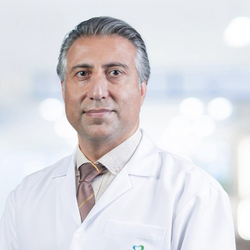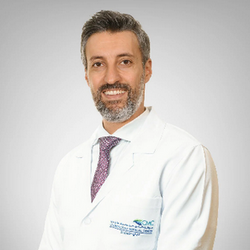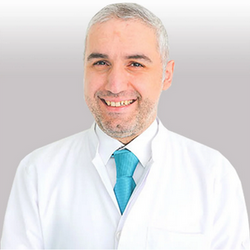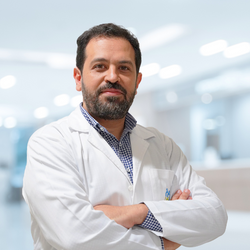Filter By
Name
Consultation Mode
Gender
Price Range












Oncologist in Dubai, Abu Dhabi, Sharjah & Across UAE | Cancer Specialists – ShopDoc
If you or a loved one are facing a cancer diagnosis, finding the right oncologist is critical. ShopDoc connects you with leading oncologists in Dubai, Abu Dhabi, Sharjah, and throughout the UAE who specialize in diagnosing, treating, and managing all types of cancer. Our network of highly qualified cancer specialists offers personalized, compassionate care tailored to your unique needs.
What Does an Oncologist Do?
An oncologist is a medical doctor trained in the detection, treatment, and management of cancer. Oncologists work closely with patients throughout every stage of their cancer journey, from diagnosis and staging to treatment and follow-up care. Their expertise covers various types of cancer, including breast, lung, colorectal, prostate, blood cancers (leukemia, lymphoma), and many others. They employ a combination of chemotherapy, radiation therapy, immunotherapy, targeted therapy, and surgical options to optimize patient outcomes.
Types of Oncologists
-
Medical Oncologists: Focus on treating cancer using chemotherapy, hormone therapy, immunotherapy, and targeted treatments.
-
Radiation Oncologists: Specialize in cancer treatment using radiation therapy.
-
Surgical Oncologists: Perform surgeries to remove tumors and cancerous tissues.
-
Pediatric Oncologists: Treat cancer in children and adolescents.
Common Cancers Treated by Oncologists
-
Breast cancer
-
Lung cancer
-
Colorectal cancer
-
Prostate cancer
-
Leukemia and lymphoma
-
Skin cancer (melanoma and non-melanoma)
-
Gynecological cancers (ovarian, cervical, uterine)
-
Head and neck cancers
-
Gastrointestinal cancers
Diagnostic and Treatment Services
-
Comprehensive cancer screening and early detection
-
Biopsy and pathological analysis
-
Advanced imaging techniques including PET scans, CT scans, and MRIs
-
Personalized chemotherapy regimens
-
Radiation therapy planning and administration
-
Immunotherapy and targeted drug treatments
-
Surgical cancer removal and reconstructive surgery
-
Palliative and supportive care services
-
Genetic counseling and risk assessment
Why Choose ShopDoc for Oncology Care?
-
Access to board-certified oncologists with extensive experience
-
Multidisciplinary cancer care teams for integrated treatment
-
State-of-the-art diagnostic and treatment facilities in Dubai, Abu Dhabi, Sharjah, and other Emirates
-
Personalized treatment plans tailored to individual patient needs
-
Convenient online appointment booking and teleconsultations
-
Supportive care including psychological counseling and rehabilitation
When Should You See an Oncologist?
If you experience symptoms such as unexplained weight loss, persistent fatigue, lumps or swelling, unusual bleeding, changes in bowel or bladder habits, or have abnormal results from cancer screening tests, consulting an oncologist promptly can be lifesaving. Early diagnosis and treatment significantly improve survival rates.
Frequently Asked Questions (FAQ)
What is the role of an oncologist in cancer treatment?
Oncologists oversee the entire cancer care process, from diagnosis to treatment planning, managing therapies, and follow-up care.
Are all cancers curable?
While many cancers are treatable and some curable, outcomes depend on cancer type, stage at diagnosis, and individual patient factors.
What types of treatment will an oncologist recommend?
Treatment may include surgery, chemotherapy, radiation, immunotherapy, targeted therapy, or combinations tailored to the specific cancer and patient.
Can I get second opinions from oncologists on ShopDoc?
Yes, you can book consultations with multiple oncologists to get second opinions and make informed treatment decisions.
Is online oncology consultation effective?
Teleconsultations are effective for follow-ups, treatment planning discussions, and symptom management, complementing in-person care.
Who is an Oncologist?
An expert in identifying and treating cancers is known as an oncologist. There are three primary subfields within this field: radiation oncology, which uses radiation to kill cancer cells; surgical oncology, which involves removing tumors; and medical oncology, which uses chemotherapy, immunotherapy, and other drugs.
Conditions Treated by Oncologists
All types of cancer are treated by oncologists, including melanoma, leukemia, lymphoma, prostate, lung, and breast cancer. Alongside other medical specialists, they create treatment plans that, depending on the cancer's type and stage, may involve immunotherapy, radiation, chemotherapy, or surgery.
When to see an oncologist.
If a patient has unusual symptoms or abnormal test results, such as lumps, unexplained weight loss, persistent fatigue, or abnormal blood markers that suggest cancer, their primary care physician or specialist may refer them to an oncologist. Oncologist visits may also result from routine cancer screenings for high-risk individuals.
FAQ
What is the role of an oncologist?
Using techniques like chemotherapy surgery and radiation, oncologists identify, treat, and manage different forms of cancer.
When should someone see an oncologist?
Symptoms such as unexplained lumps, blood abnormalities, or other unusual symptoms are usually the reason for a referral.
What types of cancer treatments do oncologists offer?
The type and stage of the cancer determine the treatment options, which may include immunotherapy, radiation therapy, chemotherapy, and surgery.
Is it possible to cure cancer completely?
Early detection can cure certain cancers, while continuous treatment prolongs the lives of others.
ShopDoc India
All rights reserved by ShopDoc FZ LLC,
In5 Tech, Dubai Internet City


